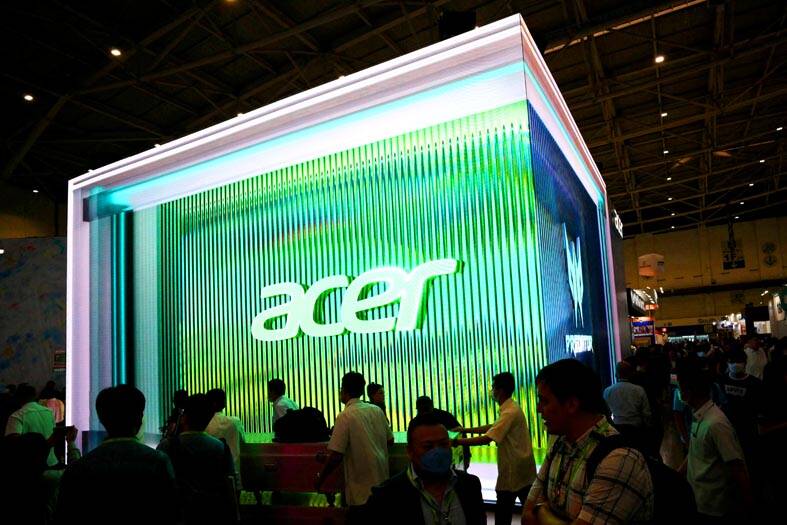PC brand Acer Inc (宏碁) yesterday reported that its net profit last year rose 12.31 percent year-on-year to NT$5.54 billion (US$168 million), the highest in three years, as its revenue increased 9.69 percent and operating profit — or net income derived from its core businesses — gained 15.41 percent from the previous year.
Earnings per share (EPS) last year grew to NT$1.84, from NT$1.64 the previous year, Acer said in a statement.
The announcement came as the firm released its financial results for the final quarter of last year, which showed that net profit came in at NT$1.43 billion, compared with NT$1.02 billion during the same period a year earlier. EPS rose to NT$0.47 in the quarter, from NT$0.34 the previous year, Acer said.

Photo: Sam Yeh / AFP
With last year’s net profit reaching a three-year high, the company’s board of directors proposed distributing a cash dividend of NT$1.7 per share, Acer said.
If approved by shareholders on May 29, the planned cash dividend would represent a payout ratio of 92.39 percent.
Acer’s revenue last year totaled NT$264.68 billion, compared with NT$241.31 billion the previous year, thanks to recovering demand for desktop PCs, notebook computers and consumer electronics amid an end to inventory adjustment, despite no notable benefits yet from artificial intelligence (AI) PC products.
Operating profit increased to NT$4.88 billion from NT$4.23 billion a year ago, which the company attributed partly to contributions from its subsidiaries, while operating margin improved to 1.84 percent from 1.75 percent.
Acer has in recent years continued to diversify its business and set up more subsidiaries to generate new earnings sources. The company has 13 listed subsidiaries so far, it said.
“Businesses other than personal computers and displays contributed 37.4 percent of the operating income and 28.3 percent of the revenue in 2024,” Acer said in the statement.
Acer’s subsidiaries span various fields, including cybersecurity, beverages, apparel, home appliances, AI-assisted cloud services, medical solutions, gaming software and hardware, and charging piles.

TAKING STOCK: A Taiwanese cookware firm in Vietnam urged customers to assess inventory or place orders early so shipments can reach the US while tariffs are paused Taiwanese businesses in Vietnam are exploring alternatives after the White House imposed a 46 percent import duty on Vietnamese goods, following US President Donald Trump’s announcement of “reciprocal” tariffs on the US’ trading partners. Lo Shih-liang (羅世良), chairman of Brico Industry Co (裕茂工業), a Taiwanese company that manufactures cast iron cookware and stove components in Vietnam, said that more than 40 percent of his business was tied to the US market, describing the constant US policy shifts as an emotional roller coaster. “I work during the day and stay up all night watching the news. I’ve been following US news until 3am

Six years ago, LVMH’s billionaire CEO Bernard Arnault and US President Donald Trump cut the blue ribbon on a factory in rural Texas that would make designer handbags for Louis Vuitton, one of the world’s best-known luxury brands. However, since the high-profile opening, the factory has faced a host of problems limiting production, 11 former Louis Vuitton employees said. The site has consistently ranked among the worst-performing for Louis Vuitton globally, “significantly” underperforming other facilities, said three former Louis Vuitton workers and a senior industry source, who cited internal rankings shared with staff. The plant’s problems — which have not

TARIFF CONCERNS: The chipmaker cited global uncertainty from US tariffs and a weakening economic outlook, but said its Singapore expansion remains on track Vanguard International Semiconductor Corp (世界先進), a foundry service provider specializing in producing power management and display driver chips, yesterday withdrew its full-year revenue projection of moderate growth for this year, as escalating US tariff tensions raised uncertainty and concern about a potential economic recession. The Hsinchu-based chipmaker in February said revenues this year would grow mildly from last year based on improving supply chain inventory levels and market demand. At the time, it also anticipated gradual quarter revenue growth. However, the US’ sweeping tariff policy has upended the industry’s supply chains and weakened economic prospects for the world economy, it said. “Now

COLLABORATION: Given Taiwan’s key position in global supply chains, the US firm is discussing strategies with local partners and clients to deal with global uncertainties Advanced Micro Devices Inc (AMD) yesterday said it is meeting with local ecosystem partners, including Taiwan Semiconductor Manufacturing Co (TSMC, 台積電), to discuss strategies, including long-term manufacturing, to navigate uncertainties such as US tariffs, as Taiwan occupies an important position in global supply chains. AMD chief executive officer Lisa Su (蘇姿丰) told reporters that Taiwan is an important part of the chip designer’s ecosystem and she is discussing with partners and customers in Taiwan to forge strong collaborations on different areas during this critical period. AMD has just become the first artificial-intelligence (AI) server chip customer of TSMC to utilize its advanced